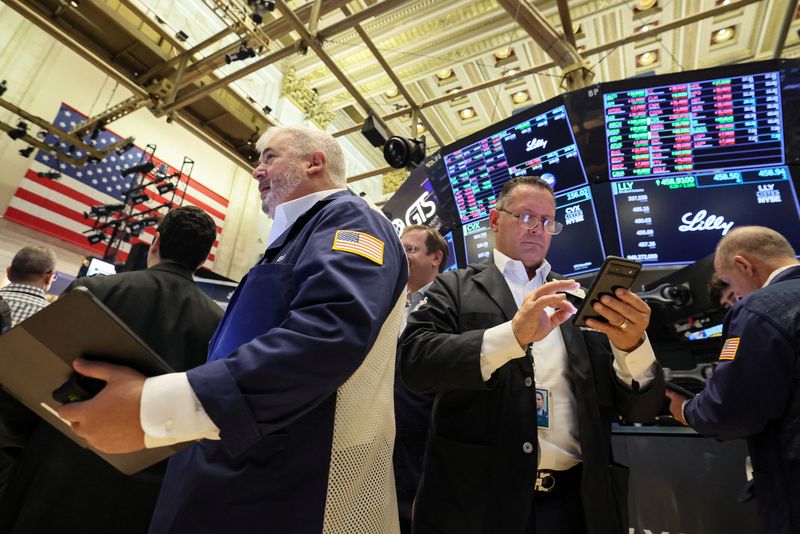(Reuters) – Wall Street futures tumbled on Wednesday after rating agency Fitch’s move to downgrade the U.S. government’s credit rating sparked a flight to safety in global financial markets.
Fitch downgraded the United States to AA+ from AAA, citing fiscal deterioration over the next three years as well as a growing general government debt burden, making it the second major rating agency after Standard & Poor’s move in 2011 to strip the country of its triple-A rating.
The yield on U.S. 10-year Treasury notes slipped to 4.02%. Gold and the Japanese yen rose, while the dollar remained steady. [US/]
“When the debt of the world’s largest economy is seen as lower quality, it will naturally trouble investors and make them rethink their portfolios,” said Laith Khalaf, head of investment analysis at AJ Bell.
“It might also surprise some people given how the U.S. economy is proving to be more resilient than expected.”
Megacap stocks including Tesla, Nvidia, Meta Platforms and Microsoft fell between 1.2% and 2.7% in premarket trading, dragging the Nasdaq 100 futures down by 1.1%.
Beating the trend, Advanced Micro Devices rose 1.2% before the bell after forecasting an upbeat finish to the year and on plans to launch AI chips that could compete with market leader Nvidia.
U.S. second-quarter earnings are now expected to fall 5.9% from a year earlier, as per Refinitiv data, compared with a 7.9% decline estimated a week earlier.
Some of the major companies reporting today include CVS Health, Humana, DuPont Fidelity National and Spirit AeroSystems.
The benchmark S&P 500 and tech-heavy Nasdaq took a breather in the previous session as investors entered a seasonally slow August. The blue-chip loaded Dow ended higher, underpinned by gains in Caterpillar after the global economic bellwether posted upbeat quarterly profits.
Among other early movers, Starbucks slipped 2.0% after the world’s largest coffeehouse chain missed market expectations for quarterly comparable sales.
Investors also await the ADP National Employment report for July that could offer more clues on the domestic labor market, ahead of much awaited non-farm payrolls data due on Friday.
(Reporting by Johann M Cherian in Bengaluru; Editing by Saumyadeb Chakrabarty)








